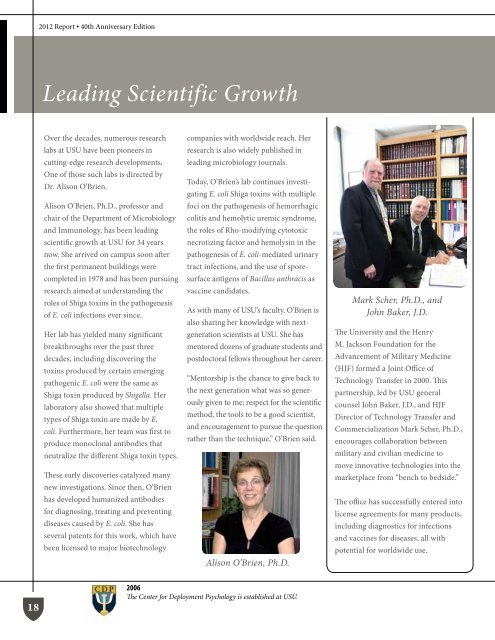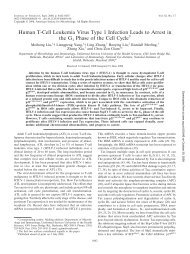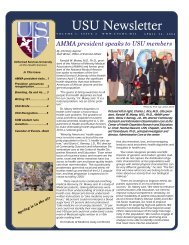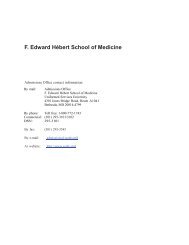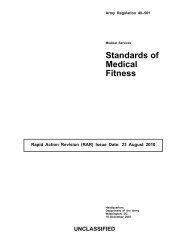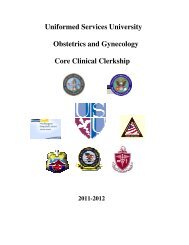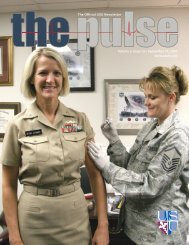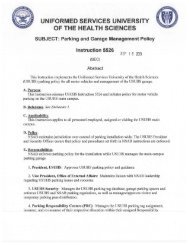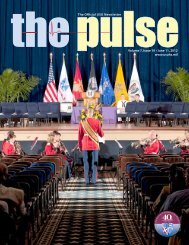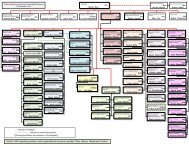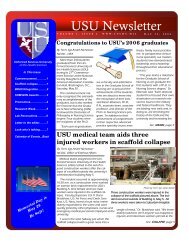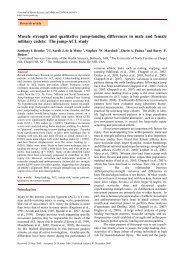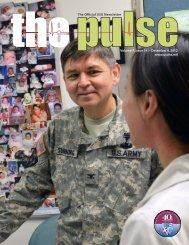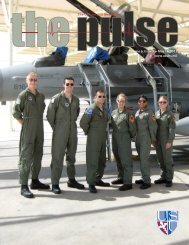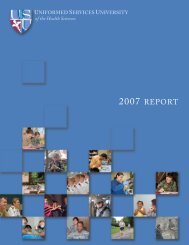2012 Annual Report - Uniformed Services University of the Health ...
2012 Annual Report - Uniformed Services University of the Health ...
2012 Annual Report - Uniformed Services University of the Health ...
You also want an ePaper? Increase the reach of your titles
YUMPU automatically turns print PDFs into web optimized ePapers that Google loves.
<strong>2012</strong> <strong>Report</strong> • 40th Anniversary Edition<br />
Leading Scientific Growth<br />
Over <strong>the</strong> decades, numerous research<br />
labs at USU have been pioneers in<br />
cutting-edge research developments.<br />
One <strong>of</strong> those such labs is directed by<br />
Dr. Alison O’Brien.<br />
Alison O’Brien, Ph.D., pr<strong>of</strong>essor and<br />
chair <strong>of</strong> <strong>the</strong> Department <strong>of</strong> Microbiology<br />
and Immunology, has been leading<br />
scientific growth at USU for 34 years<br />
now. She arrived on campus soon after<br />
<strong>the</strong> first permanent buildings were<br />
completed in 1978 and has been pursuing<br />
research aimed at understanding <strong>the</strong><br />
roles <strong>of</strong> Shiga toxins in <strong>the</strong> pathogenesis<br />
<strong>of</strong> E. coli infections ever since.<br />
Her lab has yielded many significant<br />
breakthroughs over <strong>the</strong> past three<br />
decades, including discovering <strong>the</strong><br />
toxins produced by certain emerging<br />
pathogenic E. coli were <strong>the</strong> same as<br />
Shiga toxin produced by Shigella. Her<br />
laboratory also showed that multiple<br />
types <strong>of</strong> Shiga toxin are made by E.<br />
coli. Fur<strong>the</strong>rmore, her team was first to<br />
produce monoclonal antibodies that<br />
neutralize <strong>the</strong> different Shiga toxin types.<br />
These early discoveries catalyzed many<br />
new investigations. Since <strong>the</strong>n, O’Brien<br />
has developed humanized antibodies<br />
for diagnosing, treating and preventing<br />
diseases caused by E. coli. She has<br />
several patents for this work, which have<br />
been licensed to major biotechnology<br />
companies with worldwide reach. Her<br />
research is also widely published in<br />
leading microbiology journals.<br />
Today, O’Brien’s lab continues investigating<br />
E. coli Shiga toxins with multiple<br />
foci on <strong>the</strong> pathogenesis <strong>of</strong> hemorrhagic<br />
colitis and hemolytic uremic syndrome,<br />
<strong>the</strong> roles <strong>of</strong> Rho-modifying cytotoxic<br />
necrotizing factor and hemolysin in <strong>the</strong><br />
pathogenesis <strong>of</strong> E. coli-mediated urinary<br />
tract infections, and <strong>the</strong> use <strong>of</strong> sporesurface<br />
antigens <strong>of</strong> Bacillus anthracis as<br />
vaccine candidates.<br />
As with many <strong>of</strong> USU’s faculty, O’Brien is<br />
also sharing her knowledge with nextgeneration<br />
scientists at USU. She has<br />
mentored dozens <strong>of</strong> graduate students and<br />
postdoctoral fellows throughout her career.<br />
“Mentorship is <strong>the</strong> chance to give back to<br />
<strong>the</strong> next generation what was so generously<br />
given to me: respect for <strong>the</strong> scientific<br />
method, <strong>the</strong> tools to be a good scientist,<br />
and encouragement to pursue <strong>the</strong> question<br />
ra<strong>the</strong>r than <strong>the</strong> technique,” O’Brien said.<br />
Alison O’Brien, Ph.D.<br />
Mark Scher, Ph.D., and<br />
John Baker, J.D.<br />
The <strong>University</strong> and <strong>the</strong> Henry<br />
M. Jackson Foundation for <strong>the</strong><br />
Advancement <strong>of</strong> Military Medicine<br />
(HJF) formed a Joint Office <strong>of</strong><br />
Technology Transfer in 2000. This<br />
partnership, led by USU general<br />
counsel John Baker, J.D., and HJF<br />
Director <strong>of</strong> Technology Transfer and<br />
Commercialization Mark Scher, Ph.D.,<br />
encourages collaboration between<br />
military and civilian medicine to<br />
move innovative technologies into <strong>the</strong><br />
marketplace from “bench to bedside.”<br />
The <strong>of</strong>fice has successfully entered into<br />
license agreements for many products,<br />
including diagnostics for infections<br />
and vaccines for diseases, all with<br />
potential for worldwide use.<br />
18<br />
2006<br />
The Center for Deployment Psychology is established at USU.


